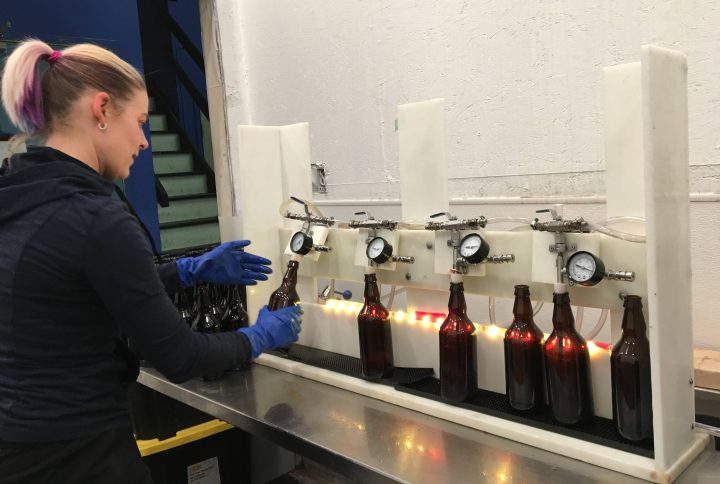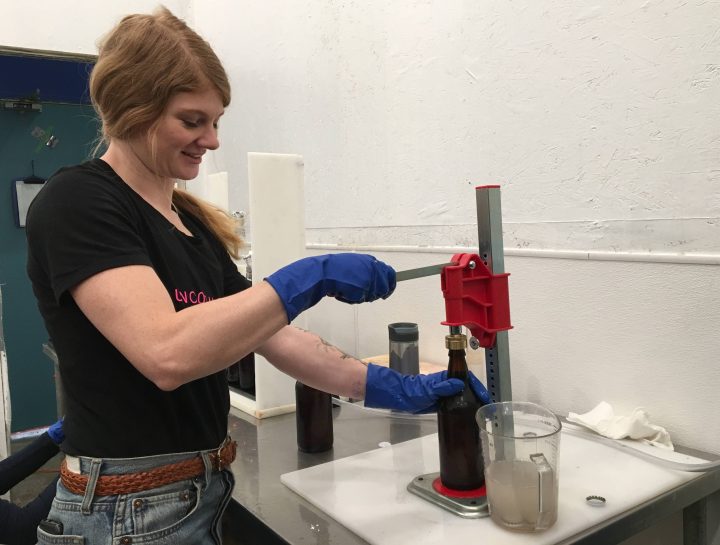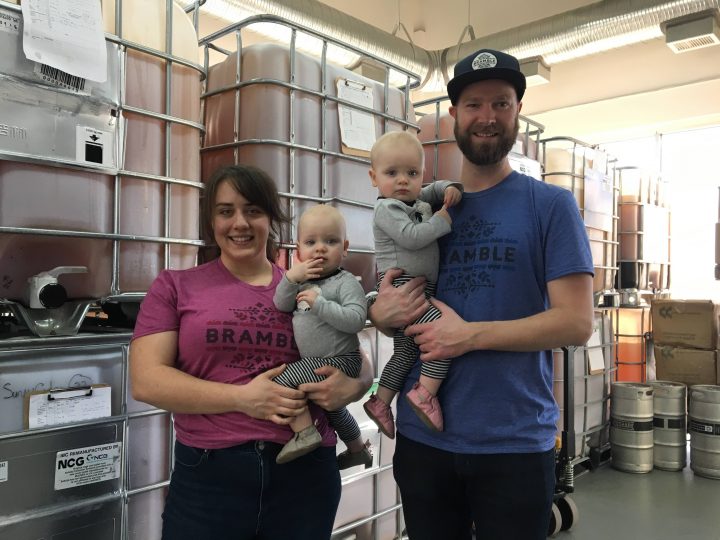This is Part 4 in our Alberta Matters series on alcohol. Click here to read Part 1 on craft beer marketing and tourism, Part 2 on market saturation concerns, Part 3 on inter-provincial trade barriers hampering the growth of craft distilleries, and Part 5 on the passion distillers have for making local spirits.

Alberta’s cider industry has shown significant growth, despite feeling the squeeze from a number of factors.
According to the province, there were 19 small manufacturer licensees that either manufactured or contract-produced the fermented apple and other fruit-based alcoholic drink in Alberta during the 2019 calendar year.
Uncommon Cider Co. of Calgary is one of those bottling the fruits of their labour.
“Cider is as much science as it is art,” founder Brodie Thomas said.
READ MORE: Capitalizing on Alberta’s craft beer boom: marketing, branding and tourism in 2020
Thomas is considered Alberta’s cider pioneer by many in the industry. He officially started making cider commercially four years ago but has been doing it as a hobby for about a decade.
He has seen the industry grow but also struggle.
“It’s been challenging,” he said.

He recently set up shop in what’s termed Calgary’s Barley Belt alongside a number of craft beer breweries. He said he has seen firsthand the advantage beer operators have over cider.
Thomas said not only are there huge differences when it comes to the process and timeline of both, but there are also big discrepancies when it comes to provincial liquor markups.

Get daily National news
“Right now, we’re paying like two to three times more than beer. We’d love parity in order to level the playing field,” he said.
Thomas has support from other cider producers, including SunnyCider owner Tim Kitchen.
“We’re not treated equitably in the grand scheme of things,” Kitchen told Global News. “We pay a higher price or higher rate to produce our alcohol than the breweries would.”
SunnyCider was the first craft cidery to officially open a brick-and-mortar establishment dedicated to cider in Calgary. Although it has only been open since August 2019, Kitchen began home-fermenting cider in 2010.
Kitchen has also been surprised at the other challenges he’s faced, including getting the product into liquor stores and restaurants as well as convincing Alberta drinkers what cider is all about.
“Being able to educate consumers as well as being able to make them aware of the product has been more of a challenge than what I had anticipated,” he said.
Another challenge being faced by many Alberta cider producers? Supply. The bulk of the apple juice they get has to be shipped in from B.C.
“We want to grow an Alberta economy around fruit production,” Kitchen said. “The challenge is there is only one or two fruit producers when it comes to apples in the province.”
Still, it’s an industry that is attracting others.
Story continues below playlist
LISTEN BELOW: Corus Alberta radio coverage of Alberta Matters
Tyler Crowdis founded Bramble Cider and is considered a contract brewer. He used SunnyCider’s shop to brew his first batch, which will be out soon.
He would have liked to set up his own cidery but said that’s not in the cards right now.
“I tried a couple of times to get into some warehouses and it just financially wasn’t in place,” Crowdis said.
READ MORE: Still room’ left in Alberta’s booming brewing and distilling industry: brewery founder
He is grateful to Kitchen for this break, despite officially being his competition.
Kitchen told Global News he doesn’t look at other cider players as competition; instead, he said it’s about helping colleagues and creating awareness and jobs across the province.
“Creating employment, creating economic diversity, putting money back into the local economies,” he said.
David Gingrich, fondly referred to as “The Beer Guy” at Willow Park Wines & Spirits, said it’s great to see the industry growing so quickly in the province.
“It’s giving us cider we can call our own,” Gingrich said. “There’s something happening. There’s a movement, right? So it’s not just beer.”
Gingrich is urging the government to change the current rules.
“The government needs to step in there and start helping these guys and give them something that they can actually grow with,” he said.
Global News reached out to the province about liquor markups faced by the cider industry.
In a statement, the press secretary for the Minister of Economic Development, Trade and Tourism Justin Brattinga said: “Liquor markups depend on the type of product, and cider falls under a separate category from beer. Cider would fall under the ‘refreshment beverages’ category.”
Brattinga added that product sold from the manufacturing facility is available at a reduced markup rate.
The current producers hope to get what they call a “fair” rate soon so they can tap into the potential of a lucrative business, for themselves and all of Alberta.
“It’s growing and I really want it to keep growing,” Thomas said. “I’m excited about the future.”
READ MORE: Small manufacturers struggle to grow in Alberta’s craft alcohol industry








Comments